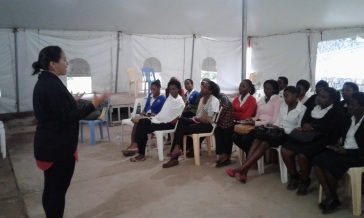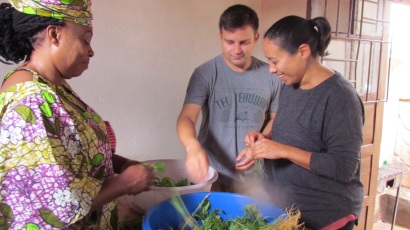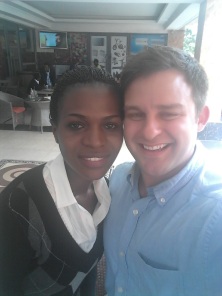“If the Asian Tiger was the economic success story of the last decades of the 20th century, the African Lion is going to be the success story of the twenty-first.” –Ashish J. Thakkar, Founder, Mara Group and Africa’s first billionaire
“Women Hold Half the Sky.” –Mao Zedong
To explain the timing of our #africamp adventure: In December, Jamie left her long and celebrated tenure at Camp Tel Yehudah and I completed my MBA at Baruch College. It was with a new education, interest and curiosity towards private sector solutions that I arrived to Africa, and my expectations for seeing those solutions in action were met and easily exceeded.
Foreign aid conversations produce endless eye-rolls and shrugs. Our ethos dictates to give to the less fortunate; but the results of our foreign aid produce a mixed picture at best, and a failure at worst. But this is not just a foreign aid challenge, it is a general philanthropy problem. Improving “monitoring and evaluation” is an organizational hot topic in the non-profit world to compensate for the philanthropic sector’s lack of access to the best monitoring and evaluation tool: the market.
As Jacqueline Novogratz, states in The Blue Sweater, “Philanthropy alone lacks the feedback mechanisms of markets, which are the best listening devices we have.”
Businesses serve and rely on their customers. If a company cannot provide satisfactory services for a reasonable price, the customer finds it somewhere else and the company dies a natural death. However, many non-profits serve an audience but rely on a different group: funders. This bifurcation often creates “zombie” organizations that do not effectively serve their audience, but still limp along because funders artificially keep them alive, often because public fawning and praise for one’s generosity is as addictive as any drug.
This has proven to be an insurmountable challenge for much of the non-profit world.

Jamie leads a skill-building workshop on communication at Akilah.
The Global South, and Africa in particular, understands the depth of this flaw. Around a trillion dollars of charity and foreign aid have arrived to the continent since the 1950’s and the impact of all that money is… not much. Foreign aid’s most notable, and regrettable, impact has been letting cruel and incompetent dictatorships off the hook by building the country’s infrastructure for them, allowing them to pilfer national reserves. I suggest John Kerry take a page from Josh Ruxin’s book, Thousand Hills to Heaven, “the most corrupt fifteen percent of nations – twenty-five countries, more or less, should be on the foreign aid black list, except…for dire emergencies.”
Just as important, the mindset of Westerners building Africa on behalf of Africans promotes a narrative that they are unable to do it themselves; a particularly dangerous form of racism masked by noble intentions.
My time here has taught me that Africans do not need, or want, Westerners to come build the continent for them. Rwanda’s government has made cultivating local business and attracting foreign investments a top priority. Officially registering a business is not only easy, but something that can be done in six hours. President Kagame has created a culture of accountability and service within the government, setting apart Rwanda from her neighbors. Philanthropies are noticing, and more enlightened ones have figured out not to lecture Rwandans, but listen first and then support.
We had several points of contact with the African Innovation Prize, which helps schools and organizations run business plan competitions, offering educational support for contestants and one-on-one mentorship for contest winners as they get their business started. Their model involves bringing in Western MBAs and business practitioners to mentor contestant winners three months. If Jamie and I don’t find work that we like in New York, you can expect us back here in that capacity.
What’s even more encouraging is that women are leading the way and the men increasingly not only realize it, but embrace it. Rwanda’s First Lady hosts a national “Miss Geek Competition,” challenging female Rwandan students to submit concepts to improve Rwanda’s standard of living through tech-based solutions. One of the students I advised at Agahozo Shalom Youth Village, Jermaine, submitted a concept to create a text message based national emergency response system. Another student, Ornella, wants to create an app that gives women access to information, both from professionals and crowd-sourced, on how to protect their reproductive health. One of my projects at Agahozo Shalom was advising on how to start a business plan competition for students, which we want to call “Start-up Rwanda” and will augment and showcase students’ creativity, problem-solving and initiative, the foundational elements of entrepreneurship.
Last week Jamie and I saw the enterprising skills of Rwandan women at the Nyamirambo Women’s Center, which runs a grassroots community tourism service with cooking classes, walking tours, and hand-made merchandise. They take “women’s work” and redefine it to make women financially independently.

Learning how to cook at the Nyamirambo Women’s Center with Aminatha!
Jamie and I spent April consulting at the Akilah Institute for Women, which provides degrees to East African women in hospitality management, information technology management, and entrepreneurship. Jamie has developed a series of professional skill-building workshops; I worked with staff and alumnae to launch an alumnae association. The undertaking of Akilah is incredible, as are the women, who dedicate themselves to gaining the skills to provide for themselves, their family and communities. These young women come from across East Africa and epitomize how this generation is cutting against the historical grain, which dictated that men earn money while women stay home.

Selfie with Nida, Inaugural President of the Akilah Alumnae Association.
None of these women is more impressive than Nida Giselle Iraguha, who graduated in 2015, got a job at Hotel Milles Collines (AKA The Hotel Rwanda) and was quickly offered a managerial position at the Kigali Convention Center (opening soon!). Nida is also the inaugural President of the Akilah Alumnae Association and has the kind of intelligence, charisma, and curiosity to galvanize her peers to move mountains. What is exciting is that soon Nida will be the expectation, not the exception, among Rwandan women.
Jamie and I are honored and inspired to witness and contribute in our own small way to Africa’s 21st century remedy to its 20th century ailments.